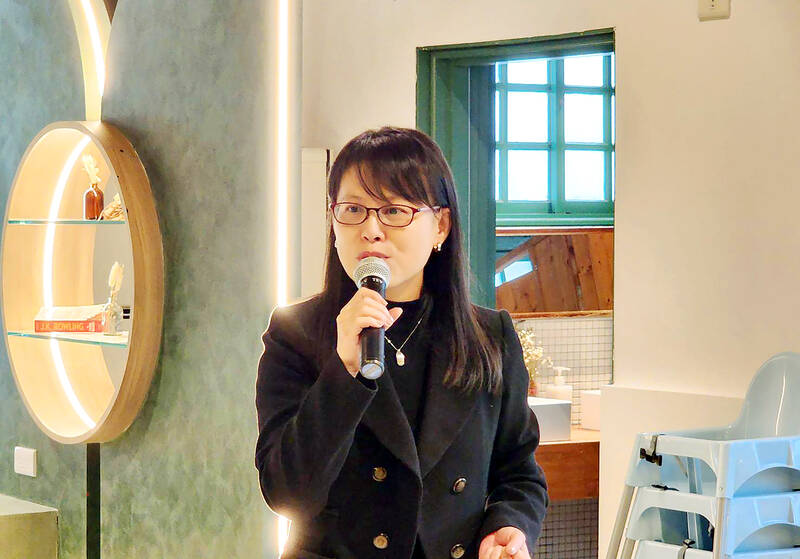Lion Travel Service Co (雄獅旅行社) yesterday said that it expects to break even this year, ending three consecutive years of losses caused by the COVID-19 pandemic.
Lion Travel general manager and spokeswoman Ann Lai (賴一青) said the company expects revenue to rise to 50 percent of pre-pandemic levels this year, after having its operations upended by the virus from 2020 to last year.
Taiwan’s reopening in October last year has allowed overseas travel to recover, Lai said, adding that the reopening has not weakened demand for domestic tourism.

Photo: CNA
“Recovery in air transport capacity will be the biggest uncertainty,” she said.
Long-distance air transport capacity has returned to 40 to 50 percent of pre-pandemic levels in the US and Europe, and 30 to 40 percent of the pre-pandemic level in Japan, Lai said, adding that demand for overseas travel would peak in the summer.
The prices of overseas package tours rose 20 to 30 percent from pre-pandemic levels and are unlikely to fall soon, due to tight air capacity, higher hotel rates and other cost increases in the supply chain, she said.
The cost of group tours for the upcoming cheery blossom festival in Japan are 20 to 30 percent higher from pre-pandemic levels, Lai said.
Meanwhile, the cost of domestic tours for the upcoming Lunar New Year holiday are up 10 percent from pre-pandemic levels, she said.
Lion Travel would dynamically adjust its packages and prices in response to market changes, she added.
The company has secured 15 percent of all Japan-bound airplane seats through charter flights, Lai said.
Lion Travel is also looking at a fast recovery in cruise tour demand this summer, she said, adding that average group charges have climbed 20 percent for 24 voyages.
The pandemic has prompted the company to evolve into a lifestyle brand, and tap into cultural tours at home and abroad, she said.
Lion Travel reduced the number of physical offices from 80 to 20 in the past three years to cut losses, but plans to add 10 to 30 offices this year in line with business improvement, Lai said.
The company would set up offices in Vietnam, Malaysia, Indonesia, Germany and other location to better integrate tourism resources and serve its customers, she said.
Lion Travel plans to expand its staff to the pre-pandemic level of 3,600 people, from 2,000, Lai said, adding that it has raised average monthly wages by 15 percent to NT$32,000 this year.

GROWING OWINGS: While Luxembourg and China swapped the top three spots, the US continued to be the largest exposure for Taiwan for the 41st consecutive quarter The US remained the largest debtor nation to Taiwan’s banking sector for the 41st consecutive quarter at the end of September, after local banks’ exposure to the US market rose more than 2 percent from three months earlier, the central bank said. Exposure to the US increased to US$198.896 billion, up US$4.026 billion, or 2.07 percent, from US$194.87 billion in the previous quarter, data released by the central bank showed on Friday. Of the increase, about US$1.4 billion came from banks’ investments in securitized products and interbank loans in the US, while another US$2.6 billion stemmed from trust assets, including mutual funds,

Micron Memory Taiwan Co (台灣美光), a subsidiary of US memorychip maker Micron Technology Inc, has been granted a NT$4.7 billion (US$149.5 million) subsidy under the Ministry of Economic Affairs A+ Corporate Innovation and R&D Enhancement program, the ministry said yesterday. The US memorychip maker’s program aims to back the development of high-performance and high-bandwidth memory chips with a total budget of NT$11.75 billion, the ministry said. Aside from the government funding, Micron is to inject the remaining investment of NT$7.06 billion as the company applied to participate the government’s Global Innovation Partnership Program to deepen technology cooperation, a ministry official told the

Taiwan Semiconductor Manufacturing Co (TSMC, 台積電), the world’s leading advanced chipmaker, officially began volume production of its 2-nanometer chips in the fourth quarter of this year, according to a recent update on the company’s Web site. The low-key announcement confirms that TSMC, the go-to chipmaker for artificial intelligence (AI) hardware providers Nvidia Corp and iPhone maker Apple Inc, met its original roadmap for the next-generation technology. Production is currently centered at Fab 22 in Kaohsiung, utilizing the company’s first-generation nanosheet transistor technology. The new architecture achieves “full-node strides in performance and power consumption,” TSMC said. The company described the 2nm process as

Even as the US is embarked on a bitter rivalry with China over the deployment of artificial intelligence (AI), Chinese technology is quietly making inroads into the US market. Despite considerable geopolitical tensions, Chinese open-source AI models are winning over a growing number of programmers and companies in the US. These are different from the closed generative AI models that have become household names — ChatGPT-maker OpenAI or Google’s Gemini — whose inner workings are fiercely protected. In contrast, “open” models offered by many Chinese rivals, from Alibaba (阿里巴巴) to DeepSeek (深度求索), allow programmers to customize parts of the software to suit their